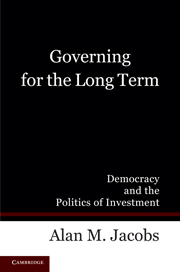Book contents
- Frontmatter
- Contents
- List of Figures and Tables
- Acknowledgments
- PART I PROBLEM AND THEORY
- 1 The Politics of When
- 2 Theorizing Intertemporal Policy Choice
- PART II PROGRAMMATIC ORIGINS: INTERTEMPORAL CHOICE IN PENSION DESIGN
- PART III PROGRAMMATIC CHANGE: INTERTEMPORAL CHOICE IN PENSION REFORM
- PART IV CONCLUSION
- Bibliography
- Index
2 - Theorizing Intertemporal Policy Choice
Published online by Cambridge University Press: 05 June 2012
- Frontmatter
- Contents
- List of Figures and Tables
- Acknowledgments
- PART I PROBLEM AND THEORY
- 1 The Politics of When
- 2 Theorizing Intertemporal Policy Choice
- PART II PROGRAMMATIC ORIGINS: INTERTEMPORAL CHOICE IN PENSION DESIGN
- PART III PROGRAMMATIC CHANGE: INTERTEMPORAL CHOICE IN PENSION REFORM
- PART IV CONCLUSION
- Bibliography
- Index
Summary
One common view of democratic politics suggests both a clear prediction of policy myopia and a clear explanation of it. Office-seeking politicians, in this view, must regularly appeal to short-sighted voters and thus face strong incentives to mortgage the future for near-term benefits and to leave long-term problems to their successors. Indeed, a bias toward the present seems built into the temporal rhythm of democracy, an unhappy side effect of the frequent and competitive elections that lie at the core of popular rule.
At the same time, elected governments sometimes do choose to invest in the world beyond the next election. Politicians in advanced democracies at times enact costly regulations to mitigate long-term environmental harm, raise taxes to shrink budget deficits and debt, and take steps to limit the extraction of natural resources. Common approaches to the politics of public policy have a harder time explaining this fact – why elected officials would ever impose short-term costs on constituents for distant gain. More precisely, existing theories are not well suited to explaining variation in governments' intertemporal policy choices: why they sometimes maximize near-term benefits but at other times impose short-run pain for long-run gain.
The aim of this chapter is to develop a set of theoretical insights that can help us explain variation in elected governments' intertemporal policy choices. What factors, we will ask, affect the likelihood that an elected government will make a policy investment?
- Type
- Chapter
- Information
- Governing for the Long TermDemocracy and the Politics of Investment, pp. 28 - 72Publisher: Cambridge University PressPrint publication year: 2011
- 2
- Cited by



